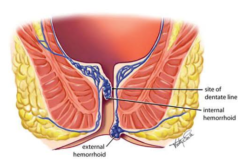
Have you ever had to deal with the pain and embarrassment caused by hemorrhoids? If so, then you know just how much of an impact they can have on your daily life. For many people, hemorrhoids can be both uncomfortable and embarrassing, making it difficult to seek help or even talk about them. But understanding this condition is key to properly treating it – which is why we've put together this comprehensive guide! Here you'll learn everything there is to know about hemorrhoids, from causes and symptoms to treatments and prevention tips. With this knowledge in hand, you will become empowered with the necessary tools for effectively treating your own symptoms while avoiding future flare-ups altogether.
Overview of Hemorrhoids - Definition, Symptoms, Causes, and Risk Factors
Hemorrhoids are a common condition that affects many individuals across the world. Also known as piles, hemorrhoids are enlarged veins in the rectum or anus that can lead to discomfort or pain. They are differentiated into two types, internal and external, based on their location. Though the exact causes of hemorrhoids remain unknown, certain factors such as chronic constipation, obesity, and pregnancy can increase the risk of developing hemorrhoids. Symptoms of hemorrhoids include pain or discomfort, itching, swelling, and difficulty sitting. Fortunately, there are various treatment options available for hemorrhoids, ranging from home remedies to medical procedures, that can help alleviate the discomfort of this condition.
Dietary Modifications to Help Manage Hemorrhoids
Hemorrhoids, also known as piles, can be a painful and uncomfortable condition to deal with. Thankfully, there are several dietary modifications that can help to manage hemorrhoids and alleviate some of the symptoms associated with this condition. Some of the changes you can make include increasing your fiber intake to soften your stool, drinking plenty of water to stay hydrated, and reducing your consumption of spicy or acidic foods that can irritate your digestive system. Additionally, avoiding alcohol and caffeine and incorporating more foods that are high in flavonoids can also help to reduce inflammation. With the right dietary modifications, you may be able to manage your hemorrhoids and alleviate some of the discomfort that comes with this condition.
Natural Remedies for Treating Hemorrhoid Symptoms
Hemorrhoid treatment symptoms can be both embarrassing and uncomfortable, leaving sufferers searching for an effective solution. While over-the-counter remedies can provide relief, some individuals prefer to explore natural remedies for treating hemorrhoid symptoms. One such remedy is witch hazel, which is known for its anti-inflammatory and astringent properties. Another natural approach is to increase fiber intake and water consumption to promote regular bowel movements and reduce the strain on the affected area. Additionally, taking warm baths with Epsom salts or soaking in a sitz bath can offer soothing relief. By incorporating some of these natural remedies into your routine, you may find relief from the discomfort caused by hemorrhoid symptoms.
Non-Surgical Treatments for Managing Hemorrhoids
Hemorrhoids can be a painful and uncomfortable condition that affects many people. The good news is that there are non-surgical treatments available to help manage this condition. These treatments can help to alleviate the symptoms of hemorrhoids, including pain, itching, and swelling. Depending on the severity of your condition, your doctor may recommend using creams, ointments, or suppositories to help soothe the affected area. You may also be able to find relief through lifestyle changes, such as increasing your water and fiber intake or using specialized cushions to relieve pressure. If you are experiencing symptoms of hemorrhoids, it's important to speak with your doctor to discuss your treatment options and find a plan that works best for you.
How to Prevent Hemorrhoids from Reoccurring
If you've experienced the discomfort and pain of hemorrhoids, you know how important it is to prevent them from reoccurring. Hemorrhoids are swollen veins in the anal region and can cause itching, pain, and bleeding. One of the best ways to prevent these symptoms is to maintain a healthy diet. High-fiber foods like fruits, vegetables, and whole grains can help prevent constipation, which is a common cause of hemorrhoids. It's also vital to avoid straining while on the toilet and to use a stool softener if necessary. Regular exercise and staying hydrated can also help reduce the chances of hemorrhoids coming back. If you experience any symptoms, make sure to seek hemorrhoid treatment to prevent the condition from escalating. With these preventive measures, you can alleviate the pain and discomfort of hemorrhoids and avoid reoccurrence.
When to Seek Medical Attention for Your Hemorrhoid Symptoms
Dealing with hemorrhoids can be an uncomfortable and painful experience, but it's important to know when to seek medical attention. With various over-the-counter treatments available, it's tempting to try to manage the symptoms on your own. However, if your hemorrhoidal symptoms persist or become increasingly severe, it's time to consult with a healthcare provider. These symptoms include bleeding, itching, irritation, or pain in the anal area. More serious symptoms like blood in your stool, difficulty passing stools, or if your hemorrhoid has become external should never be ignored and can be a sign of a larger issue. By seeking timely medical attention for your hemorrhoid symptoms, you can receive proper treatment and avoid any potential complications.
